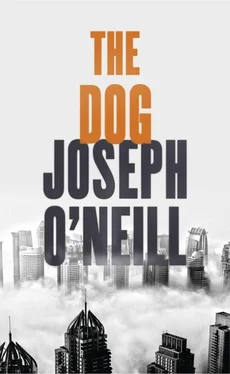Now he ordered one drink after another. Like a couple of old actuaries, we could not avoid surveying the various outcomes that long-lost friends or near-friends had met with. Eddie, with his Facebook account, was much more up to speed than I. From him I learned that one poor soul had had two autistic children, and that another had intentionally fallen into traffic from an overpass near Dublin airport. As he talked, I was confronted with a strangely painful idiosyncratic memory — how, during the rugby season, a vast, chaotic crowd periodically filled the street on which our house was situated and, seemingly by a miracle of arithmetic, went without residue into the stadium at the top of the road, a fateful mass subtraction that would make me think, with my youngster’s lavish melancholy, of our species’ brave collective merriness in the face of death. Out of the stadium came from time to time the famous Irish refrain,
Alive, alive-o
Alive, alive-o.
Obviously, I did not share this flashback with Eddie.
He removed a pair of sunglasses from his breast pocket and very ceremoniously put them on.
‘You’ve got to be kidding me,’ I said. The young Eddie had ridiculously worn these very shades at all times, even indoors. He was one of those guys for whom Top Gun was a big movie.
Eddie said, ‘Oh yes, I’m still rocking the Aviators.’ He said, ‘Remember that standoff with the statistics professor?’
Yes, I remembered. This man had forbidden Eddie from wearing shades to his lectures. The interdiction had crushed Eddie. His shades were fitted with lenses for his myopia; having to wear regular spectacles would have destroyed him. I advised him, ‘He can fuck himself. You do your thing. It’s a free world.’
‘He’s a total bastard. He’ll throw me out of the class.’
I said, ‘Let him! You want to wear shades, wear shades. What’s he saying — he gets to decide what you wear? Eddie, sometimes you’ve got to draw a line in the sand.’
Line in the sand? What was I talking about? What did I know about lines in the sand?
Young Eddie declared, ‘ Je vous ai compris! ’ He persisted in wearing his sunglasses. The lecturer did nothing about it.
‘That was a real lesson,’ Eddie told me at Asia de Cuba. ‘Fight them on the beaches. Fight them on the landing grounds.’ Removing the Ray-Bans — he preserved them as a talisman now, and had a collection of hundreds of tinted bifocals for day-to-day use; on his travels he personally hand-carried his shades in a customized photographer’s briefcase — Eddie told me that he’d taken over from his father the running of various Batros enterprises. In return I told him a little about my own situation. Either I was more revealing than I’d thought or Eddie Batros was now something of a psychologist, because soon afterwards he wrote to me with a job offer. He stated that he’d wanted for some time to appoint a Batros family trustee (‘to keep an eye on our holdings, trusts, investment portfolios, etc.’) but had not found a qualified person who both was ready to move to Dubai (where the Batros Group and indeed some Batros family members were nominally headquartered) and enjoyed, as such a person by definition had to, the family’s ‘limitless trust’. ‘Hoping against hope,’ as he put it, he wondered if I might be open to considering the position. His e-mail asserted,
I know of no more honest man than you.
There was no reasonable basis for this statement, but I was moved by it — for a moment I wept a little, in fact. I wrote back expressing my interest. Eddie answered,
OK. You will have to meet Sandro then decide. He will get in touch with you soon.
Sandro was the older of the two Batros brothers. I’d never met him.
Right away I came up with a plan. The plan was to fly New York — [Dubai]. This is to say, I had no interest in Dubai qua Dubai. My interest was in getting out of New York. If Eddie’s job had been in Djibouti, the plan would have been to fly New York — [Djibouti].
Of course Djibouti pops into my head for a reason. The French Foreign Legion has long maintained a presence there, and among the earliest and most reprehensibly innocent manifestations of my wish to flee New York was a fascination with the Légion étrangère . The men without a past! They suddenly struck me as marvellous, these white-kepi-wearing internationals whose predecessors fought famously, as my online searches revealed, at Magenta and at Puebla and at Dien Bien Phu, at Kolwezi and Bir Hakeim, at Aisne and Narvik and Fort Bamboo. Vous, légionnaires, vous êtes soldats pour mourir, et je vous envoie où l’on meurt . Unless the Wikipedia page misled, such were the exhortations that might drive into battle a fellow originating from any corner of the world yet beholden not at all to the compulsory systems of obligation of his native land. On the contrary, the legionnaire was bound only by the sincere comradeship into which he had voluntarily and humbly entered, a brotherly commitment captured with moving straightforwardness by his Code of Honour. I wanted to jump on a plane to Paris and sign up.
Though laughter would seem called for, I look back with astonishment and concern at this would-be soldier. How could this man, who had committed no crime and was guilty, to the best of my knowledge and belief, of not much more than the hurtfulness built into a human life — how could he find himself drawn to this absurd association of desperadoes and runaways? I remember how I yearned for a remote solitary fate causing shame and inconvenience to no one, for a life neither in the right nor in the wrong. Then along came Eddie Batros.
As the weeks passed and I heard nothing more from either Eddie or his brother and daily fought off the impulse to text Eddie for an update, it seemed that every five minutes brought mention of my new destination — Dubai. ‘God, I could be in my swimming pool in Dubai by now,’ groaned an English flight attendant during a runway holdup. The Albanian manager of my local hardware store said to somebody, ‘They got a hotel at the bottom of the sea. They got millionaires, billionaires. Beckham lives there, Brad Pitt lives there, every day you got Lamborghinis crashing into other Lamborghinis, every day you got sunshine, the gas is basically free, they got no taxes, it’s heaven on earth.’ Dubai was suddenly everywhere, even in the office. A team from Capital Markets went over there for a two-day consultation that dragged on for ten days, and the whole thing turned into such a billing blowout that Karen from Administration was forced to look into it. The travelling partners, Dzeko and Olsenburger, reported that the quantum of fees and disbursements had to be seen in the relevant factual matrix, namely that the client had put the team up in a seven-star hotel in two-thousand-USD-a-night duplex suites offering a twelve-pillow pillow menu, a forty-two-inch plasma television set in a massive gold-leaf frame, a rain room, a butler service, and Hermès shower gel and shampoo and unguents. Also significant, for the purpose of establishing an appropriate billing benchmark, was the client’s frankly carefree concierging of the hotel’s Rolls-Royce chauffeur service and its further concierging, on more than one occasion, of the hotel helicopter service. Moreover, excessive billing reasonableness by the firm might be perceived as verging on underbilling, a practice evidently inconsistent, in the eyes of this client, with a law firm of world-class standing. Afterwards, getting hammered over cocktails, Dzeko more informally stated that these oil Arabs — he didn’t want to generalize, there were other kinds of Arabs of course — these particular oil Arabs either had no understanding of how money worked, no idea about profit or value, or else knew all about it but just didn’t give a shit and took a sick fucking pleasure in seeing these Westerners running around like pigs, snorting up cash on their hands and knees.
Читать дальше
Конец ознакомительного отрывка
Купить книгу












